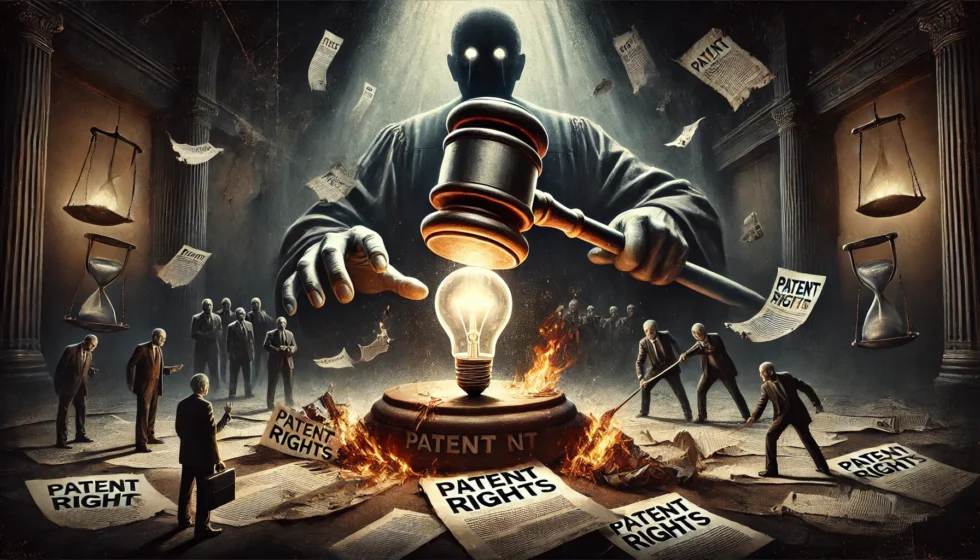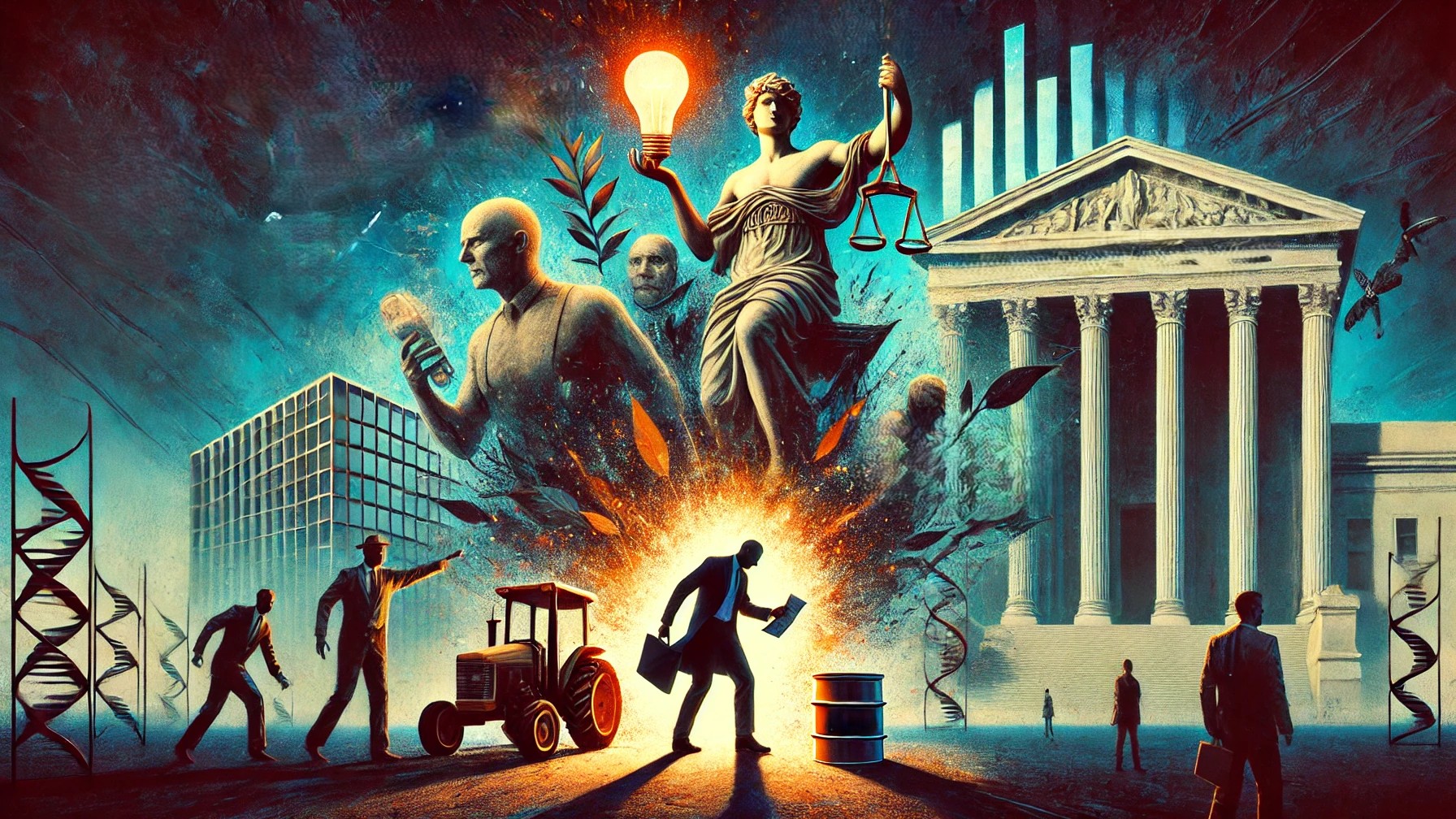
The Supreme Court’s 2006 decision in eBay v MercExchange (eBay) changed two centuries of historical precedent and law by severely curtailing the availability of injunctive relief in patent cases. This decision is among the top reasons why China now leads the world in 37 of 44 technologies critical to our economic and national security.
Recognizing eBay’s damage, S.4840, the Realizing Engineering Science and Technology Opportunities by Restoring Exclusive Patent Rights Act of 2024 (RESTORE or the RESTORE Act), was introduced in the Senate by Senators Coons and Cotton. H.R.9221, an identical companion bill by the same name, was introduced in the House by Representatives Nathaniel Moran, Deborah Ross, Hank Johnson, Chip Roy, Madeliene Dean, and Scott Peters.
Proponents of RESTORE claim it restores injunctions to the state of law prior to eBay. However, it does not. RESTORE effectively codifies the core problem of eBay and will leave U.S. innovation handicapped in ways that threaten our economic and national security. No other country handicaps their own innovation system in this way.
Two Centuries of Precedent Drove American Innovation
Adam Mossoff, a Professor of Law at Antonin Scalia Law School at George Mason University, recently published a paper entitled “Injunctions for Patent Infringement: Historical Equity Practice Between 1790 – 1882” (Research Paper).
In it, Mossoff presents the law on injunctions prior to eBay on page 2:
“In the 899 opinions in Federal Cases by federal courts sitting in equity in lawsuits filed between 1790 and 1880, no judge applied a four-factor test for issuing an injunction, either for a permanent or a preliminary injunction. […] Courts awarded permanent injunctions in 91% of the cases in which the defendant was found to infringe a patent that it failed to invalidate. Courts granted these injunctions by applying the same legal doctrines they applied when redressing continuing trespasses of real property, protecting patents as much as they protected real estate and other property interests.”
Mossoff summarizes the history of injunctions in his Legal Memorandum on RESTORE as: “If a patent owner proved that the defendant was infringing a valid patent by the unauthorized production and sale of an invention, then the patent owner was presumed to have a right to an injunction. This was no different from the right of a homeowner to obtain an injunction to remove an illegal squatter from his home.” Many courts called patent infringement a trespass.
The Court of Appeals for the Federal Circuit captured that historical precedent in eBay in a categorical rule: “a permanent injunction will issue once infringement and validity have been adjudged.”
Prior to eBay, would-be infringers developed different ways to address the threat of injunctions. They acquired startups and patents, licensed patents, designed around patents, and created opportunities for co-development and partnerships with patent owners. Competition increased because injunctions spurred innovation across the entire ecosystem and enabled new competitors to enter markets saturated with huge incumbents.
Injunctions increased competition, driving the United States to take the lead in virtually every technological revolution, from potash processing to smartphones, thereby propelling the United States to become the world’s only economic and military superpower.
eBay Severely Handicapped American Innovation
In eBay, the Supreme Court did two things: first, it mandated a novel four-factor test (eBay Factors) employed by the courts to determine whether an injunction can be granted upon a finding of patent infringement, and second, it reversed the burden to show how it survives the eBay Factors to the patent owner. These two things are distinct and different. To reverse the damage of eBay, Congress must address both.
The eBay Factors as written in eBay:
“That test requires a plaintiff to demonstrate: (1) that it has suffered an irreparable injury; (2) that remedies available at law are inadequate to compensate for that injury; (3) that considering the balance of hardships between the plaintiff and defendant, a remedy in equity is warranted; and (4) that the public interest would not be disserved by a permanent injunction. The decision to grant or deny such relief is an act of equitable discretion by the district court, reviewable on appeal for abuse of discretion.”
eBay eliminated two hundred years of historical precedent of courts granting an injunction upon the finding of infringement on a valid patent. It relegated the remedy for a violation of a private property right to be a remedy of something not a private property right, and mandated the eBay Factors the standard equitable defenses to that violation. Through its mandate, the Supreme Court disregarded prior precedent making eBay stare decisis.
Pragmatically, eBay means that if a patent owner does not have a product on the market, it is not irreparably harmed by infringement because harm can be resolved by monetary damages. Therefore, it is not eligible for an injunction.
This destroyed countless startups, especially those bringing emerging technologies to market because big corporations are incented to steal patented technology from small entities.
If a big corporation is positioned well enough to steal a patented invention from a startup and flood the market with infringing products thus running the startup out of business, it will not risk an injunction because the startup no longer has a product on the market. The value of dominating the market for a new technology is far greater than the cost of court ordered monetary damages. This opened the floodgates to massive predatory infringement.
RESTORE Abrogates eBay’s Burden Reversal
RESTORE’s single-sentence operative language:
“REBUTTABLE PRESUMPTION. — If, in a case under this title, the court enters a final judgment finding infringement of a right secured by patent, the patent owner shall be entitled to a rebuttable presumption that the court should grant a permanent injunction with respect to that infringing conduct.’’
There is no doubt RESTORE puts in place a rebuttable presumption to a possibility “that the court should grant a permanent injunction.” Clearly, this places the burden on the adjudged infringer to argue standard equitable defenses (the eBay Factors) to an injunction.
Mossoff, in his Legal Memorandum, asserts, “This single sentence abrogates the four-factor test for injunctions created by the eBay decision in 2006. It does so by explicitly reestablishing the original injunctions doctrine that was applied by all courts for violations of all property rights and was displaced by the eBay four-factor test in 2006 for the violation of patent rights.”
If RESTORE’s operative language is intended to abrogate the eBay Factors, it must do so explicitly, or it must somehow prevent the use of the eBay Factors. Nothing in RESTORE’s operative language mentions eBay, so it can not explicitly abrogate the eBay Factors.
RESTORE Does Not Abrogate the eBay Factors
In a podcast, Mossoff implied that RESTORE prevents the use of the eBay Factors, so it need not explicitly name eBay. By way of a parallel example, Mossoff explained that adding the sentence “Patentability shall not be negated by the manner in which the invention was made” to Section 103 effectively abrogated the flash of genius test created in Cuno Engineering v. Automatic Devices (Cuno) without explicitly naming the case. The operative language prevented the use of Cuno’s flash of genius test because it determined the “manner in which the invention was made.”
Unfortunately, nothing in RESTORE’s operative language prevents the use of the eBay Factors. It merely places the burden on the adjudged infringer to argue the standard equitable defenses (the eBay Factors) to an injunction instead of the patent owner.
RESTORE does not prevent the use of the eBay Factors.
eBay is Stare Decisis
Mossoff states in his Legal Memorandum that RESTORE “is a simple, single-sentence bill that would restore the law or remedies for patent infringement that existed between 1790 and 2006.” He goes on to explain that judges “will easily find 218 years of court decisions in which federal judges applied this doctrine in issuing injunctions…” and that “Judges also know how to interpret and apply the historical cases that stare decisis compels them to follow and apply in decisions today.”
He buttresses that by explaining “the eBay Court asserted that this four-factor test represented a “long tradition” and “well-established principles” in court decisions reaching back hundreds of years that “a plaintiff seeking a permanent injunction must satisfy a four-factor test.” Mossoff goes on to show that “long tradition” and “well-established principles” on which eBay was based were flawed by omission.
Mossoff is certainly correct that the basis the Supreme Court used to justify eBay is flawed, but its flawed basis does not change how eBay is applied by lower courts. It is applied as it is written, and the eBay Factors are clearly mandated to be used by the lower courts.
Many patent owners denied injunctions due to eBay having already argued stare decisis of the omitted decisions, so if stare decisis could overcome the eBay Factors, it would have already done that.
The simple fact is eBay is stare decisis, so the precedent behind it does not matter, and nothing in RESTORE changes that.
RESTORE Effectively Codifies the eBay Factors
Mossoff explains in his podcast and Legal Memorandum that if a judge is confused about the meaning of RESTORE’s operative language, it will go to the Findings to determine the intent of Congress. Mossoff asserts that the Findings abrogate the eBay Factors.
RESTORE’s first four Findings are a banality of the patent system and have nothing to do with the eBay Factors. However, RESTORE’s Finding (5) shows Congress’s intent is to evaluate injunctions under eBay Factor (1), irreparable harm:
“(5) Given the irreparable harm that is caused by multiple acts of infringement or willful infringement of a patent, courts historically presumed that an injunction should be granted to prevent such acts, with a burden on defendants to rebut such a presumption with standard equitable defenses.
(6) Recently, courts have ended the approach described in paragraph (5), which contradicts the traditional, historical practice governing the equitable remedy described in that paragraph.”
As previously discussed, the eBay Factors are the mandated standard equitable defenses in patent cases. RESTORE’s operative language places the burden on who must prove the eBay Factors to the adjudged infringer. That means the patent owner simply needs to ask for an injunction without proving anything.
Findings (5) and (6) mean the patent owner is presumed to have been irreparably harmed, which is eBay Factor (1). Therefore, the adjudged infringer must overcome at least eBay Factor (1) to overcome RESTORE’s rebuttable presumption to the possibility of an injunction.
If there is confusion as to whether the eBay Factors are still the mandated standard equitable defenses, RESTORE’s Findings (5) confirms at least eBay Factor (1), irreparable harm remains mandated. RESTORE is silent on the remaining eBay Factors.
Since nothing in RESTORE abrogates eBay or the eBay Factors, and nothing prevents the use of the eBay Factors, the courts will likely determine the Supreme Court’s mandated eBay Factors have carried through RESTORE and remain law.
Further, RESTORE’s Finding (7) seems to buttress that. It explains that the sole source of eBay’s damage is burden reversal. Importantly, it fails to explain that the source of eBay’s damage is also the eBay Factors. This, in effect, tells courts that Congress does not believe the eBay Factors cause damage, and therefore, it implies Congress accepts the eBay Factors as law.
“(7) Eliminating the traditional, historical equitable practice of applying a rebuttable presumption of injunctive relief in the case of continuing acts of infringement or willful infringement of a patent has—
(A) substantially reduced the ability of patent owners to obtain injunctions to stop continuing or willful infringement of patents; and
(B) created incentives for large, multinational companies to commit predatory acts of infringement, especially with respect to patents owned by undercapitalized entities, such as individual inventors, institutions of higher education, startups, and small or medium-sized enterprises.”
The simple fact is that RESTORE’s findings tell the courts the eBay Factors carry through RESTORE and remain the law.
RESTORE Leaves American Innovation in the Same Broken State
RESTORE cannot return the law of injunctive relief to its state prior to eBay because it does not explicitly abrogate eBay, it does not prevent the use of the eBay Factors, and stare decisis is ineffective because eBay is stare decisis. RESTORE carries through the eBay Factors, and they remain the law that did not exist prior to eBay.
RESTORE must not be passed because American innovation will remain handicapped in ways no other country handicaps their own innovation systems.
Paul Morinville is Founder and Executive Director of SPARK Innovation. SPARK Innovation strives to create an policy environment where the conception, protection, and commercialization of technologies critical to our economic and national security prosper thereby enabling the United States to take back the global technological lead from China. Paul is an inventor and has been an executive at multiple technology startups including computer hardware, enterprise middleware, video compression software, artificial intelligence, and medical devices, and has licensed patents in the U.S. and China.







STOP talking to mere government employees and talk to the BOSS, Donald John Trump, next year. He is a businessman and understands how to negotiate. Most inventors do not have negotiating skills approaching ZERO POINT ONE PERCENT of his negotiating skills. Explain how US patents will help to employ people in the US, to make products in the US, using US sourced raw materials. He will listen. He will act.
Mr. Morinville is absolutely right in pointing out that the RESTORE Act is illusory and does not actually fix the problem. (Seriously, I wish they’d put more effort into drafting the actual substance of an act than they do in coming up with cute acronyms.)
If, as Professor Mossoff claims, the RESTORE Act “abrogates the four-factor test for injunctions created by the eBay decision,” and, “does so by explicitly reestablishing the original injunctions doctrine that was applied by all courts for violations of all property rights,” why not simply say that? Indeed, a plain English statute to the effect that, “Upon establishing infringement of a valid patent, a patentee shall be entitled to permanent injunction unless the infringing party establish by clear an compelling evidence that a definite and material harm to the public interest will result.” The exception should apply only to things such as that granting the injunction will remove a needed drug from the market causing deaths that could be avoided, etc., and be unavailable except in the most extreme an rare situations.
Why the proposed remedy for the terrible eBay decision and its sequelae involves ambiguous language that does NOT say what is ostensibly intended and will likely cause even more harm has not been explained.
The patenting process leads to have our national security in danger and this is what happened to me:
Recently I invented a landing system for rockets and rocket boosters. My plan is, after the patent was issued, to start contacting US aerospace agencies and companies that might be interested and rise some money to apply for international patent in different countries. The first agency was NASA and the response was not good and showed a total negligence of our national security. I was not asking to sell my patent to NASA rather to have some cash to protect the patent filed internationally. Now here’s the case, the patent is enforced in the USA but isn’t enforced worldwide which I believe is a big shame on the US patenting system.
Please visit http://www.xyzlanding.com to learn more about my patent. Thanks to the time reading my comment.